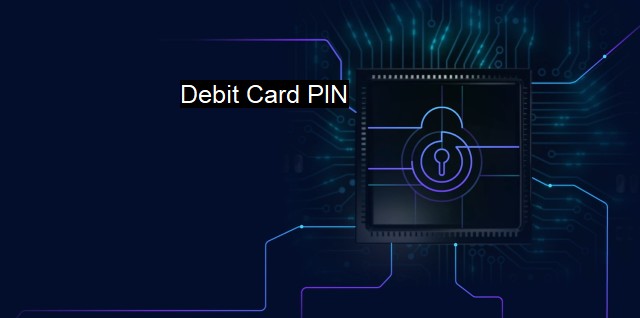What is Debit Card PIN?
Securing Payments: Understanding the Importance of Debit Card PIN in Cybersecurity
A Debit Card PIN (Personal Identification Number) is a unique numerical password that a bank provides to a customer to authenticate their identity and validate access to their bank account through automated devices like ATMs and online banking portals. An ideal PIN is usually a four-digit numerical code unique and personal to each cardholder.Under the context of cybersecurity and antivirus, the Debit Card PIN becomes a vital tool ensuring the safety of one's finances against various cyber threats and risks. While a Debit Card PIN is a simplified security method, it significantly enhances the safety factor of a person's financial transactions by serving as a standard form of two-factor authentication. It bolsters the security of user's accounts considering basic precautionary measures are in place.
Cybersecurity implies protecting internet-connected systems, including hardware and software from cyber threats. With the epidemic of internet fraud and related crimes increasing, the safety provided by a debit card PIN has never been more significant. It acts as a secure, private identifier that prevents unauthorized users from gaining access to one's financial data or transaction history.
While malware and unauthorized access commonly threaten software systems and applications, antivirus works to analyze, foresee, and eliminate these threats before they compromise the system’s integrity. In their fight against these manifestations of cyber threats, they help to maintain the integrity and confidentiality of PIN data. But the responsibility doesn't end at the bank's door - cardholders should also be proactive in PIN safety.
Protection against phishing scams, keystroke logging, and credential duplication needs robust cybersecurity measures, the forefront of which is your Debit Card PIN. Although it might seem a simple code, the PIN acts as the first defense line in securing our assets. The theft or unlawful sharing of this PIN can lead to substantial financial loss, making the protection of debit card PINs vital.
In totality, banks have the primary role not only of ensuring the existence of active cybersecurity protocols but also in educating customers on maintaining strong and secure sensitive credentials. They must focus on protecting customer PIN data by using secure, encrypted networks for transactions, and working continuously to detect and prevent potential cyber threats. Therefore, a cybersecurity breach could lead to serious ramifications including unauthorized transactions or identity thefts causing not only loss of money but reputation and trust.
Ensuring the security of a Debit Card PIN doesn't end with the role of banks, antivirus, and cybersecurity measures alone. As end users, we bear responsibility for maintaining the safety of our financial transactions. Simple but essential steps in practice, like avoiding sharing PINs, not writing it down, regularly changing the PIN can significantly escalate the security levels.
In these tech-advanced modern times, mobile banking represents another area where the Debit Card PIN wields its potential. Given that many mobile applications and internet banking modules demand a user's PIN for login and intrabank transactions, it makes the role of PIN pivotal and an enticing target to hackers. Banks have started employing cybersecurity measures even on these platforms for maintaining security.
a Debit Card PIN is more than just a four-digit number. It ensures that we, authorized users, are the only ones who can access and control our financial data. Despite its simplicity, a PIN figures extensively in providing a strong foundation for financial cybersecurity measures.
It is worth remembering that the security limitations are limitless and highly evolving. Therefore, the role of each individual, coupled with collective effort, anticipatory softwares, and keeping up-to-date with latest safety measures is an invaluable necessity to ensure the optimal exploitation of benefits a Debit Card PIN offers and, with it, safeguard our financial haven in this technology-driven era.

Debit Card PIN FAQs
What is a debit card PIN?
A debit card PIN is a personal identification number that is used to access your bank account through an ATM or when making a purchase with your debit card. It serves as a security measure to ensure that only you have access to your funds.How can I create a strong debit card PIN to protect my account from cyber threats?
To create a strong debit card PIN, use a combination of numbers, symbols, and letters. Avoid using easily guessable information like your birthdate or address. Also, change your PIN regularly to reduce the risk of fraud.What should I do if I suspect that someone has stolen my debit card PIN?
If you suspect that someone has stolen your debit card PIN, contact your bank immediately to report the incident. Your bank can help you cancel your card and issue a new one. Be sure to monitor your account for any unauthorized transactions and report them to your bank as well.Is it safe to use my debit card PIN on public computers?
No, it is not safe to use your debit card PIN on public computers as they may be infected with malware that can capture your information. Always use your own device or a trusted computer when accessing your bank account or using your debit card.| | A | | | B | | | C | | | D | | | E | | | F | | | G | | | H | | | I | | | J | | | K | | | L | | | M | |
| | N | | | O | | | P | | | Q | | | R | | | S | | | T | | | U | | | V | | | W | | | X | | | Y | | | Z | |
| | 1 | | | 2 | | | 3 | | | 4 | | | 7 | | | 8 | | |||||||